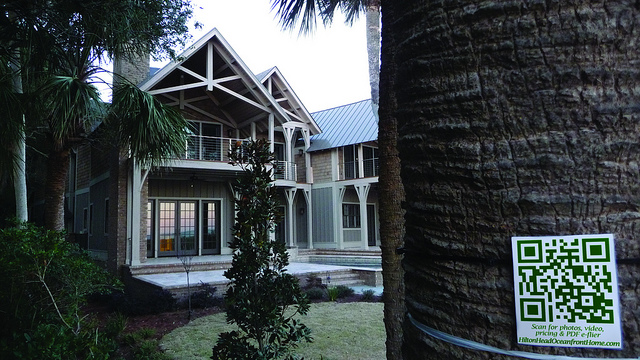
QR Code Marketing on Hilton
Head Island by haroc
A good salesman is always looking for new and more effective ways to reach his potential customers. The recent trend for most of marketers is to reach their customers as quickly and effectively as possible. Maybe that's why there has been so much debate about using Quick Response codes in real estate marketing recently. But are they really so effective? Perhaps a better question is: are they being used effectively.
Stephen Dupuis, President and CEO of the Building Industry & Land Development Association, recently wrote a comment on the growing usefulness of QR codes in the construction industry.
Mr. Dupuis emphasizes the ability of QR codes to "allow potential purchasers the chance to take virtual tours of condominium foyers, individual units and even see the view from a floor that hasn't even been built yet" along with providing potential purchasers additional information on the builder and other projects nearby — all from viewing a newspaper advertisement. While this certainly sounds interesting, the practical usability of this solution is questionable, just like the future of QR codes themselves, as Dupuis admits.
"Whether it's a passing fad or here to stay, these QR codes are a great tool that gets information about the development industry," he concluded. Well, are they?
Wait a second — what is a Quick Response code?

Example QR code
by Wikimedia commons
If you're already familiar with the concept of quick response codes, you may want to skip this part. For those who would like to educate themselves a little, a Quick Response (QR) code is a specific matrix barcode (two-dimensional code) readable by dedicated QR barcode readers and camera-equipped mobile phones. The encoded information may contain text, URL, and other data.
An example of a QR code, source: Wikipedia.org
QR codes were originally created in Japan, where they are pretty common, being one of the most popular types of 2D barcodes. The West, until recently, has been slower in adopting this technology. However, the support for QR codes has been growing rapidly during the last few years.
There are various ways in which QR codes can be used, ranging from art through entertainment to marketing. In Japan, they are even used at cemeteries as a way of sharing additional information and uniting mourners.
At the moment, QR codes are supported by almost all smart phones; many Android, Nokia, and Blackberry phones come with QR code readers pre-installed.
QR code hype vs. real usage
Marketing and technology always go hand-in-hand, and today the goal is to get the message across as quickly and effectively as possible. The philosophy of QR codes reflects these two basic conditions, and they seem to come in handy when promoting traditional products.
According to many, they were bound to become "the next big thing" in real estate. Just a few months ago, the QR code hype was reaching its peak, and real estate marketing bloggers have been very enthusiastic in sharing tips for their most effective usage. But do these tips really work?
Let's get to the facts. According to a recent study by Quorus, only 45% of Canadians are aware of the codes, while only one in ten are actually using them. Which QR codes are the most frequently scanned? Product barcodes were the most popular of "last scanned" codes (22%), followed by magazine and newspaper barcodes, BBM barcodes, grocery items (all 14%), airline tickets, other phones, and coupons and promotions (all 5%).
On the other hand, the overall usage of QR codes is growing every day. People mostly scan them to get additional product information, while a minority of users also use QR codes for mobile payment.
The problem here is obvious: the lack of actual data that would shed some light on the efficiency of QR codes. Nothing answers the question of whether a potential customer that scans the QR code of a product actually buys the product afterwards; No research seems to address the consequences of QR code use.
New technology requires a new attitude
In real estate marketing, just like in any other area of business, using a QR code is useful to the seller only if it's useful to the buyer.
Jeff Turner, President of Zeek Interactive and the Founder and creative force behind Real Estate Shows, believes that QR codes should offer something special instead of being mere alternatives to common URLs. To him, being special isn't the same as being different.
"Why should you use a QR code?" he wrote on his blog. "To be different is not good enough for me. If you're going to get me to use it and be happy about it, make it worth my time. Make it about me, not about you. Too much focus in on the 'perceived' benefit to the agent."
In other words, the use of technology shouldn't become an end in itself. It should be purposeful and targeted. It should be aimed to benefit the potential customer. Most real estate agents simply put their website's encoded URL on their business cards or signs and direct anyone who scans them right into their online presentations. But what purpose does it serve if the website isn't "QR-visitor-friendly?" If it isn't, scanning a QR code is almost no different than using a standard hyperlink.
Finally, certain technologies may not serve everyone the same way. Traditional methods of marketing might work better within some local markets. Some agents are simply more effective with more "old school" approaches. Some people are simply more comfortable doing stuff "the old way" unless they're truly convinced that the "new way" is much better. And no barcode device will ever convince them; only the marketer can. Change must always begin from the inside.
Many new ideas are often implemented almost without any consideration of their true potential. Technology itself isn't the ultimate key to success: it's much more about how we can use it. In other words, until we have intelligent robots that will do all the hard work for us, we should remain sober in what can we expect of "miraculous" technologies.
So what special bonus would you like to receive after scanning a QR code with your smartphone?





It looks like you’ve put a lot of work into this article. I commend you for your thorough work.